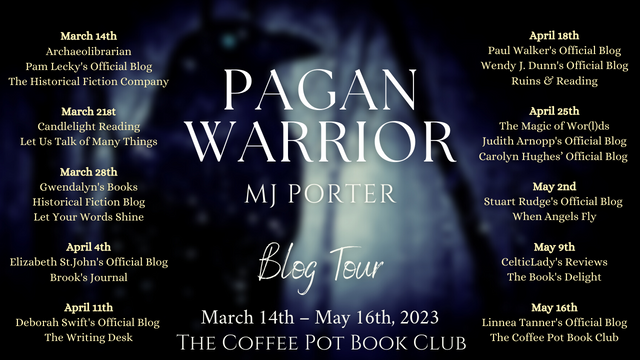Pagan Warrior
The Seventh Century
by MJ Porter
Publication Date: May 25th, 2015
Publisher: MJ Publishing
Pages: 294
Genre: Historical Fiction / Action & Adventure
Audiobook: narrated by Matt Coles
From bestselling author, MJ Porter comes the tale of the mighty pagan king, Penda of Mercia.
Britain. AD632.
Penda, a warrior of immense renown, has much to prove if he is to rule the Mercian kingdom of his dead father and prevent the neighbouring king of Northumbria from claiming it.
Unexpectedly allying with the British kings, Penda races to battle the alliance of the Northumbrian king, unsure if his brother stands with him or against him as they seek battle glory for themselves, and the right to rule gained through bloody conquest.
There will be a victor and a bloody loser, and a king will rise from the ashes of the great and terrible battle of Hædfeld.
Mercia’s legacy as part of an early, united England
Thank you for hosting me on the blog today.
The kingdom of Mercia was one of the most enduring of the early Saxon kingdoms. It has a varied career, achieving its peak under the eighth-century rulers, King Æthelbald and Offa, both claiming descent from Eowa, one of the characters featured in Pagan Warrior. And yet, it was eventually subsumed into the larger ‘England,’ that formed from 925 onwards under King Athelstan, grandson of King Alfred.
 |
| Map from Hel-hama, CC BY-SA 3.0 <https://creativecommons.org/licenses/by-sa/3.0>, via Wikimedia Commons |
But the name Mercia has long endured. Today, you’ll find the police force is called the West Mercian Police, and indeed, I grew up with the name Mercia on my lips, for all many would now call the region The Midlands, unless they grew up in a house where the past was very much alive.
The name Mercia itself is said to mean ‘on the borders,’ but whether those borders were the ones with the Welsh kingdoms or elsewhere is not entirely sure. At its peak, in the eighth century, it far overflowed the boundaries of the Midlands, including Kent, and the kingdom of the East Angles. It is also said to have been so powerful that King Alfred’s grandfather, King Ecgberht, was forced to flee to the court of Charlemagne in fear for his life in the early 800s. And indeed, Offa tried to marry into the family of Charlemagne and also to found an archbishopric to rival that of Kent and York, both of which he failed to achieve.
In later years, when England was formed, the ealdordom and later earldom of Mercia were maintained as a means of the English king exerting control over his realm. Alongside the East Anglian, Wessex, Kent and Northumbrian earldoms, Mercia was governed by a collection of men, and in the final hundred years of its existence, before the events of 1066, often to be found in the hands of one family, that of the House of Leofwine, although there were also hiccups along the way. Eadric Streona ruled Mercia for some time in the early 1000s before his death at the hands of King Cnut, who imposed his men over Mercia, particularly where it still abutted the Welsh kingdoms. And indeed, the House of Godwine had one or two who held earldoms in Mercia as well. But, the House of Leofwine endured throughout the period, rising and falling with the whims of their king, until eventually, both fell. The last male member of the House of Leofwine was held captive for many years after the rebellion against the rule of William the Conqueror.
The boundaries of what was the Mercian kingdom seem to have been maintained throughout this period, no matter how it was chopped up and governed by a variety of different earls of the counties, which formed at an earlier date than many might realise.
Yet, for all that, Mercia has no native source. There is no Bede, who wrote The Ecclesiastical History of the English People, a Northumbrian, to tell of Mercia’s triumphs, and neither is there an Anglo-Saxon Chronicle, begun at the Wessex court of King Alfred by 890 at the latest, with a strong Mercian basis. However, it is believed that an element of a Mercian Register may be behind the entries relating to one of Mercia’s most famous women, Lady Æthelflæd, the lady of Mercia from about 887-June 918. She is strongly associated with both Tamworth (although the castle is more modern) and Gloucester, where she was buried.
Why Mercia has no native source is open to interpretation. It’s long been thought any such history may have fallen foul of the attacks of the Viking raiders, and indeed, when studying the charter evidence for the period, it is sobering to see that charters were purposefully reissued because they had been burned, no doubt in a house fire, if the reason was no more sinister than that.
Mercia certainly had its share of powerful rulers and families who might have wished to write about its glories. And many wealthy religious establishments could have endeavoured to do so. There is a fine tradition of writing from Worcester in the early twelfth century, perhaps attempting to redress this uneven balance.
 |
| Ruins of St. Oswald Priory, Gloucester (c) MJ Porter |
M J Porter
MJ Porter is the author of many historical novels set predominantly in Seventh to Eleventh-Century England, as well as three twentieth-century mysteries. Raised in the shadow of a building that was believed to house the bones of long-dead Kings of Mercia, meant that the author’s writing destiny was set.











No comments:
Post a Comment